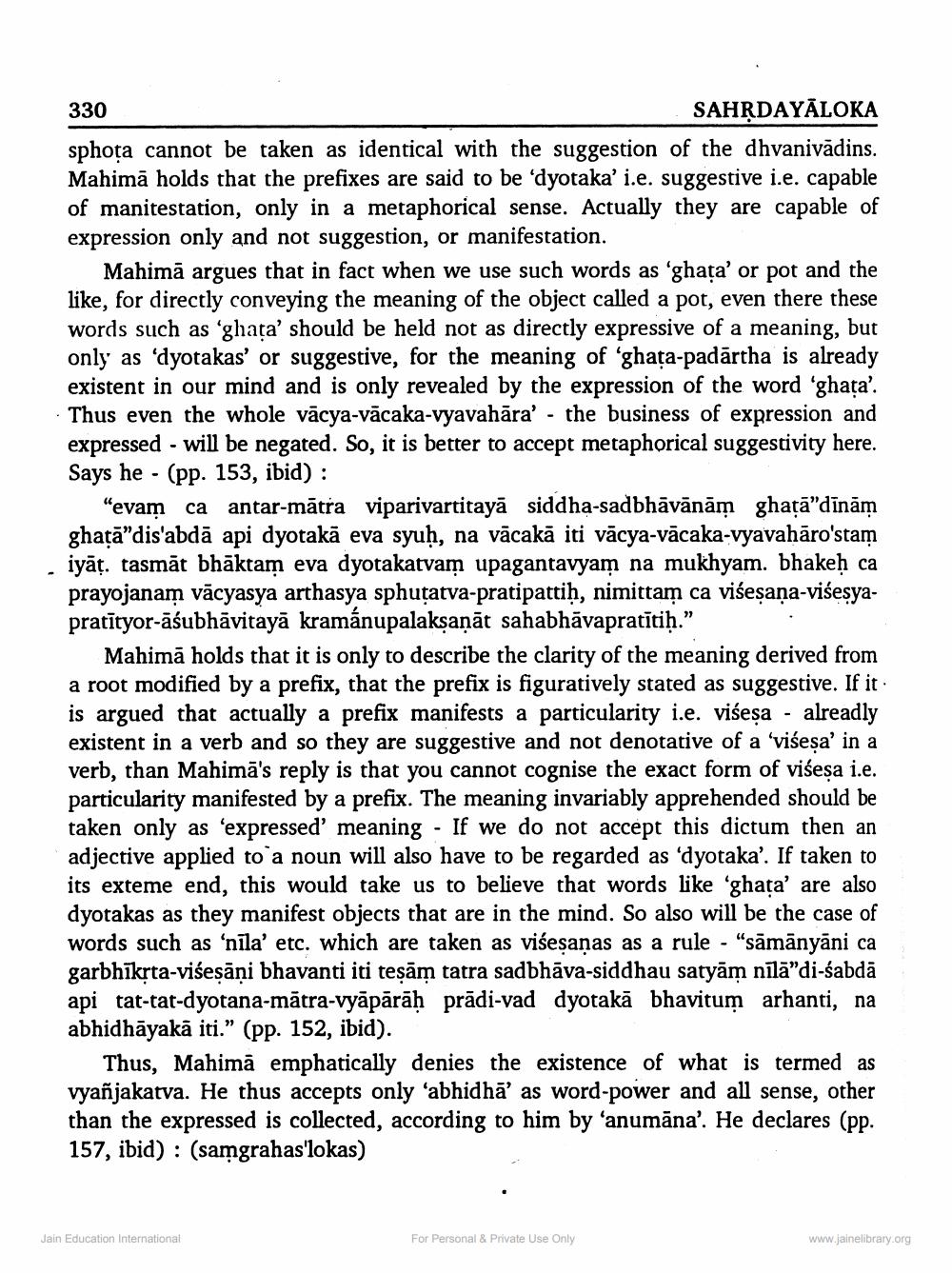________________
330
SAHṚDAYĀLOKA
sphota cannot be taken as identical with the suggestion of the dhvanivadins. Mahima holds that the prefixes are said to be 'dyotaka' i.e. suggestive i.e. capable of manitestation, only in a metaphorical sense. Actually they are capable of expression only and not suggestion, or manifestation.
Mahima argues that in fact when we use such words as 'ghata' or pot and the like, for directly conveying the meaning of the object called a pot, even there these words such as 'ghata' should be held not as directly expressive of a meaning, but only as 'dyotakas' or suggestive, for the meaning of 'ghața-padartha is already existent in our mind and is only revealed by the expression of the word 'ghata'. Thus even the whole väcya-vācaka-vyavahāra' - the business of expression and expressed - will be negated. So, it is better to accept metaphorical suggestivity here. Says he (pp. 153, ibid) :
6
·
"evam ca antar-mātra viparivartitaya siddha-sadbhāvānām ghaṭā"dīnām ghaṭā"dis'abdā api dyotaka eva syuḥ, na vācakā iti vācya-vācaka-vyavahāro'stam iyāt. tasmāt bhāktam eva dyotakatvam upagantavyam na mukhyam. bhakeḥ ca prayojanam vācyasya arthasya sphutatva-pratipattiḥ, nimittam ca viseṣaṇa-viśesyapratītyor-āśubhāvitayā kramánupalakṣaṇāt sahabhāvapratītiḥ."
Mahima holds that it is only to describe the clarity of the meaning derived from a root modified by a prefix, that the prefix is figuratively stated as suggestive. If it is argued that actually a prefix manifests a particularity i.e. viseṣa alreadly existent in a verb and so they are suggestive and not denotative of a 'viśesa' in a verb, than Mahima's reply is that you cannot cognise the exact form of viseșa i.e. particularity manifested by a prefix. The meaning invariably apprehended should be taken only as 'expressed' meaning If we do not accept this dictum then an adjective applied to a noun will also have to be regarded as 'dyotaka'. If taken to its exteme end, this would take us to believe that words like 'ghata' are also dyotakas as they manifest objects that are in the mind. So also will be the case of words such as 'nila' etc. which are taken as viseṣaṇas as a rule - "sāmānyāni ca garbhikṛta-viśeṣāņi bhavanti iti teṣām tatra sadbhāva-siddhau satyām nīlā"di-śabdā api tat-tat-dyotana-mātra-vyāpārāḥ prādi-vad dyotaka bhavitum arhanti, na abhidhāyakā iti." (pp. 152, ibid).
-
Jain Education International
Thus, Mahima emphatically denies the existence of what is termed as vyañjakatva. He thus accepts only 'abhidha' as word-power and all sense, other than the expressed is collected, according to him by 'anumāna'. He declares (pp. 157, ibid) (samgrahas'lokas)
-
For Personal & Private Use Only
www.jainelibrary.org




